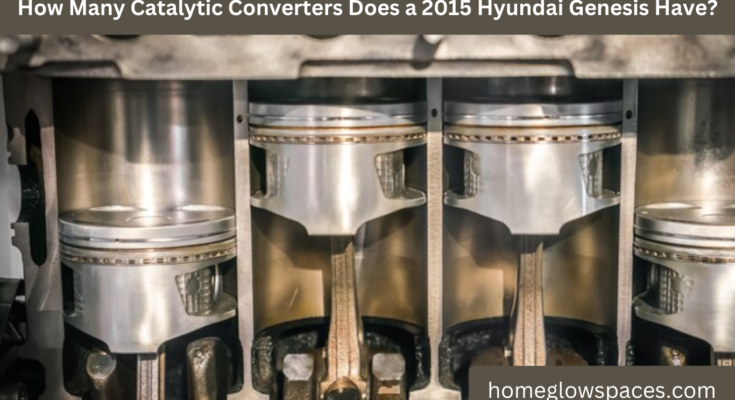The 2015 Hyundai Genesis is one of those cars that best defines an integration of luxury and sturdy engineering. The catalytic converter would be one of the core parts of its exhaust system and would be discussed in light of the number needed, roles played, and when to perform the maintenance activity.
What is a Catalytic Converter?
It is an emissions reduction device installed into an automobile’s exhaust system.. In reality, the catalytic converter works in such a manner as to change lethal gaseous pollutants to far less noxious chemicals into the exhaust gases emitted, carbon dioxide, nitrogen, and water vapors; platinum, palladium, and rhodium act as catalyzing agents.
Catalytic converters are not only essential for environmental regulations but also for optimal engine performance. A malfunctioning converter can lower fuel economy, increase emissions, and perhaps harm the engine.
How Many Catalytic Converters Does the 2015 Hyundai Genesis Have?
For this reason, the number of catalytic converters in any vehicle depends largely on how its engine is configured. The 2015 Hyundai Genesis came in two styles: a 3.8-liter V6, and a 5.0-liter V8, thus each style having its individual configuration determines the exhaust system design used, which also determines its possible catalytic converters.
- 3.8-Liter V6 Engine: 89 wordsHumanize AIThis engine has two catalytic converters. This dual exhaust system is designed to have one assigned converter per exhaust manifold. This way, emissions control for each bank of cylinders would be effective.
- 5.0-Liter V8 Engine: The same is true for the big V8. There are two catalytic converters found in this engine, like in the V6. But, as in the previous, the dual exhaust design divides the exhaust flow that calls for one converter on each bank of cylinders.
Regardless of the engine type, both configurations use a dual catalytic converter system to meet stringent emission standards while delivering powerful performance.
Why Does the Genesis Have Two Catalytic Converters?
Two catalytic converters have several purposes:
- Emission Control: The splitting of the exhaust flow ensures that each converter processes the gases produced by its respective bank of cylinders efficiently.
- Performance Optimization: The dual setup balances the exhaust flow, reducing backpressure and improving engine efficiency
- Regulatory Compliance: Modern vehicles are bound by strict emission standards. The dual setup ensures the Genesis meets the requirements without compromising its performance.
Common Catalytic Converter Issues
Catalytic converters are built to last long, but they can also face some problems. The common problems associated with catalytic converters are:
- Clogging: Carbon deposits and debris build up inside the converter, causing a reduction in airflow over time
- Overheating: Malfunctions in the fuel system of the engine result in excessive fuel entering the converter, leading to overheating.
- Physical Damage: Road debris or impacts damage the converter, affecting its functionality.
- Theft: The catalytic converters are an excellent incentive for thieves, as they contain valuable metals inside. The Genesis, in its dual setup, can make it an attractive target.
Maintaining the Catalytic Converters in a Hyundai Genesis
Proper maintenance of catalytic converters in a 2015 Hyundai Genesis ensures the durability and performance. Here are some tips:
- Regular Inspections: Always check the exhaust system in regular maintenance for early signs of trouble.
- Monitor Engine Performance: Pay attention to symptoms like decreased fuel efficiency, poor acceleration, or a sulfurous smell that might be related to the catalytic converter.
- Use Quality Fuel: High-quality fuel decreases the likelihood of carbon build up; in this way, it prolongs the life of the converter.
- Avoid Short Trips: Short trips do not allow converter to reach optimal operating temperature, which causes inefficiencies and buildup.
- Replacement Costs and Considerations
If a catalytic converter in your Genesis needs replacement, be prepared for potentially high costs. Replacement costs can range from $1,000 to $3,000 per converter, depending on labor charges and whether original equipment manufacturer (OEM) parts are used.
Such saves money, but aftermarket converters should be a good quality and compatible for use with your vehicle. Always consider taking your car to a professional mechanic for advice on how it should be done.
Conclusion
A 2015 Hyundai Genesis can either come with a 3.8L V6 or 5.0L V8, and this automobile is fitted with two catalytic converters. The system therefore allows for efficient emission control as well as perfect engine performance and compliance to environmental standards. Though catalytic converters are made to last longer, timely inspection and attention to the faults might help extend their service.
Understanding catalytic converters and the roles and requirements they play help keep your Genesis in good working order, thus contributing to a clean environment. If you think you have a problem with your catalytic converter, see a professional as soon as possible to prevent further damage.
FAQsIt is an emissions reduction gadget put within an auto exhaust system
1. How can I tell if my catalytic converter is failing? Signs include decreased fuel mileage, poor performance, and a smell of sulfur (rotten eggs) or the presence of the check engine light turning on.
2. Can I drive my Genesis with a faulty catalytic converter? Technically one can drive with a dead converter, but it certainly is not advisable. Low performance, increased emissions will result, and other engine damage can occur.
3. Are aftermarket catalytic converters a good option? Aftermarket converters are a more affordable option to use, but they lack the quality and performance required of OEM parts.
4. How long do catalytic converters typically last?Catalytic converters may endure for 70,000 to 100,000 miles or more if properly maintained.
5. Is catalytic converter theft common for the 2015 Hyundai Genesis? Because the Genesis contains such valuable metals, like many modern vehicles, it is a prime target for catalytic converter theft. Anti-theft devices may be installed to prevent theft.
Staying updated and proactive can ensure that your Hyundai Genesis will continue to run at its best performance while also adhering to all emission standards.



